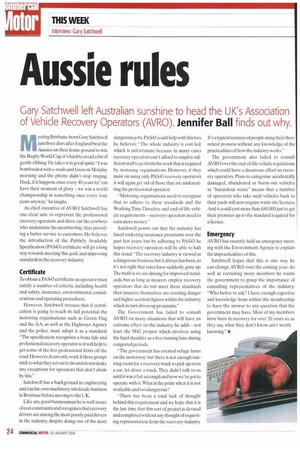Aussie rules
Page 24

If you've noticed an error in this article please click here to report it so we can fix it.
Gary Satchwell left Australian sunshine to head the UK's Association of Vehicle Recovery Operators (AVRO). Jennifer Ball finds out why.
Meeting Brisbane-born Gary Satchwell just three days after England beat the Aussies on their home ground to win the Rugby World Cup,it's hard to avoid a bit of gentle ribbing. He takes it in good spirit"! was bombarded with e-mails and faxes on Monday morning and the phone didn't stop ringing. Heck, if it happens once every 40 years let 'em have their moment of glory — we win a world championship in something once every four years anyway," he laughs.
As chief executive of AVRO, Satchwell has one clear aim: to represent the professional recovery operators and drive out the cowboys who undermine his membership, thus providing a better service to customers. He believes the introduction of the Publicly Available Specification (PAS43) certificate will go a long way towards meeting this goal, and improving standards in the recovery industry.
Certificate
lo obtain a PAS43 certificate an operator must satisfy a number of criteria, including health and safety. insurance, environmental considerations and operating procedures.
However, Satchwell stresses that if certification is going to reach its full potential the motoring organisations such as Green Flag and the AA. as well as the Highways Agency and the police, must adopt it as a standard: "The specification recognises a bona fide and professional recovery operator so it will help to get some of the less professional firms off the road.However,it can only work if these groups stick to what they set out to do and do not make any exceptions for operators that don't abide by this."
Satchwell has a background in engineering and ran his own machinery wholesale business in Brisbane before moving to the UK.
Like any good businessman he is well aware of cost constraints and recognises that recovery drivers are among the most poorly paid drivers in the industry, despite doing one of the most dangerous jobs. PAS43 could help with this too, he believes: "The whole industry is cost led, which is unfortunate because in many cases recovery operators can't afford to employ sufficient staff to perform the work that is required by motoring organisations. However, it they insist on using only PAS43 recovery operators it will again get rid of those that are undercutting the professional operator.
"Motoring organisations need to recognise that to adhere to these standards and the Working Time Directive and end-of-life vehicle requirements — recovery operators need to earn more money.
Satchwell points out that the industry has faced rocketing insurance premiums over the past few years, but by adhering to PAS43 he hopes recovery operators will be able to halt this trend: "The recovery industry is viewed as a dangerous business. but it always has been,so it's not right that rates have suddenly gone up. The truth is we are driving for improved standards. but as long as insurers employ recovery operators that do not meet these standards then insurers themselves are creating danger and higher accident figures within the industry, which in turn drives up premiums."
The Government has failed to consult AVRO on many situations that will have an extreme effect on the industry, he adds — not least the M42 project which involves using the hard shoulder as a live running lane during congested periods.
"The government has created refuge lanes on the motorway but there is not enough running room for a recovery truck to pick up even a car, let alone a truck. They didn't talk to us until it was a fait accompli and now we've got to operate with it. What is the point when it is not workable and too dangerous?
-There has been a total lack of thought behind this requirement and we hope that it is the last time that this sort of project is devised and completed without any thought of requesting representation from the recovery industry.
It's a typical scenario of people using their theoretical prowess without any knowledge of the practicalities of how the industry works."
The government also failed to consult AVRO over the end-of-life vehicle regulations. which could have a disastrous effect on recovery operators. Plans to categorise accidentally damaged, abandoned or burnt-out vehicles as "hazardous waste" means that a number of operators who take such vehicles back to their yards will now require waste site licences. And it could cost more than £60,000 just to get their premises up to the standard required for a licence.
Emergency
AVRO has recently held an emergency meeting with the Environment Agency to explain the impracticalities of this.
Satchwell hopes that this is one way he can change AVRO over the coming year: As well as recruiting more members he wants the government to grasp the importance of consulting representatives of the industry: "Who better to ask? I have enough expertise and knowledge from within this membership to have the answer to any question that the government may have. Most of my members have been in recovery for over 20 years so. as they say, what they don't know ain't worth knowing." •




























































































































































































